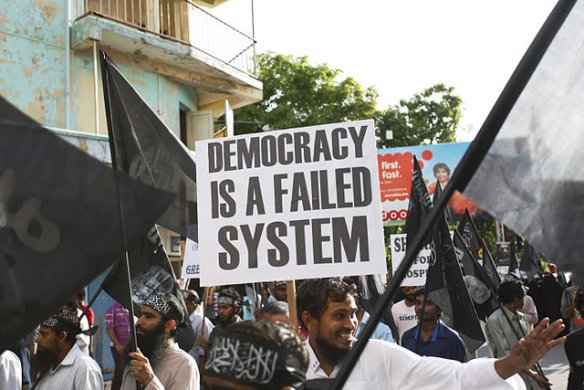
Anti-democracy, pro-Sharia public demonstration in Maldives, 2014. By RLoutfy.
Two weeks ago, the Monkey Cage ran a piece by Matthew Baum and Phil Potter suggesting that the policy of “democracy-promotion” has gone out of style.[1] I think they’re right that in many circles democracy-promotion is politically passé and that, more broadly, democracy advocates are really having a tough couple of years. In the midst of pushback against democracy agendas within democracies themselves, they are also dealing with the “comeback” of authoritarianism. [2] Setting aside the debate as to whether the recent resurgence is overstated, it does appear to be the case that while democratic countries are questioning the wisdom of promoting republics abroad, authoritarian regimes are pushing back against civil society, activists, and oppositionists, seeing them as a direct threat to their established orders.
In May, the Korbel School had the pleasure of hosting one of the world’s foremost thinkers on this topic, Maria J. Stephan (Senior Policy Fellow at the U.S. Institute of Peace, Senior Fellow at the Atlantic Council, and my sometimes co-author) as a practitioner-in-residence. In some of her recent work, she articulates a nuanced rebuttal to democratization skeptics. While she was in town, we hosted a launch event for her co-edited (with Mat Burrows) book, Is Authoritarianism Staging a Comeback?
You can watch the full video here.
We didn’t have time during the event to get to all of the questions I wanted to ask, so Maria graciously agreed to expand upon her views in writing. Here’s what we discussed:
Chenoweth: Recently, democracy-promotion and the good governance agenda have been getting a lot of flack. In recent weeks, Gordon Adams skewered the State Department’s quadrennial report for its focus on democracy-promotion in Foreign Policy Magazine, and Stewart Patrick & Isabella Bennett wrote an article with the blunt title “Geopolitics is Back—and Global Governance Is Out” in The National Interest. Lots of people are saying, “Look around—the world is falling apart. Stop talking about democracy and start talking about restoring global stability and order.” So why should democracy-promotion still be on top of the U.S. foreign policy agenda?
Stephan: Well, I’m not sure if the world is falling apart. But it is precisely because bad governance is fueling protracted violent conflict around the world that support for democratic development should be atop the US foreign policy agenda. We know historically and empirically that democracies don’t tend to go to war with each other. They tend to be better governed, have institutions and mechanisms for resolving conflicts peacefully, and make more reliable strategic partners. Furthermore, the credibility of the U.S. is enhanced globally when we are seen to advance values of dignity, human rights, and democratic freedoms that so many ordinary people around the world risk life and limb every day to defend.
The question should not be whether the U.S. should support democratic development—including here at home. The question should be how to do it more consistently and effectively. Notably by standing behind local democrats, by discouraging governments from responding to nonviolent challenges using violent force and repression, and by making long-term investments in civil society and democratic institutions. Fortunately, the new Quadrennial Diplomacy and Development Review (QDDR), the strategic roadmap for the U.S. State Department and USAID, mentions good governance and accountability over fifty times and makes the point that good governance underpins all other strategic priorities. It’s time to have a robust conversation about what that means in practical terms.
Chenoweth: Why is authoritarianism making a comeback?
….
- Read more at the blog Political Violence @ a Glance, where the full text was published 7 July 2015.
[1] This is puzzling given the well-demonstrated fact that successful democratization brings relatively more peaceful, stable times to the international community. They suggest that institutional checks protecting whistleblowers and robust, independent media are the main institutional ingredients leading to peaceful democratic behavior. Ultimately, Baum and Potter argue that when it’s done right, democracy-promotion that reinforces these crucial institutions can ultimately stabilize and reinforce peaceful world orders.
[2] It’s not settled that authoritarianism is actually on the march, but much of the disagreement stems from definitional and measurement issues.